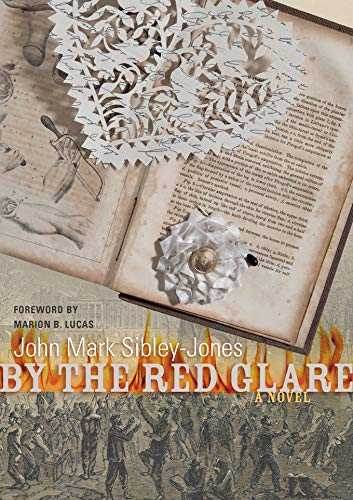
A Conversation with Mark Sibley-Jones
Mark Sibley-Jones is a phenomenal teacher, a fantastic fiction writer, and a lifelong learner. I first met Mark when I was doing my graduate work at the University of South Carolina. Even though he was an award-winning faculty member in the Honors College, Mark was still taking graduate classes for fun on subjects like critical theory.
Mark’s passion for learning is clear in his debut novel, By the Red Glare. Set on the Columbia, SC campus of the South Carolina College as the Union Army of William Tecumseh Sherman approaches, the novel captures the thoughts feelings of the men and women, the free and enslaved, who lived in South Carolina during the winter of 1864-1865. Mark will be sharing his work as one of the keynote speakers at next month’s SWU Literary Festival.
In this conversation, Mark talks about where the idea for the novel came from, the research that made the novel come alive, and where his historical and theological commitments lie.
Jonathan Sircy: Tell us about the novel’s origin. What made you decide this was the story you wanted to tell?
Mark Sibley-Jones: If memory serves, in 2010 The State newspaper published once a month over an eleven- or twelve-month period a series on several details of South Carolina’s Civil War history. I found the series riveting, and began further study by going to the South Caroliniana library, one building down from my office at USC. The library stores South Carolina memorabilia, including such items as nineteenth-century medical manuals published by South Carolina doctors.
Much of my medical information about surgery in the field and in hospitals derives from these sources. The more I read, the more intrigued I became by the possible of a narrative about life on the campus of what was then called the South Carolina College (renamed University of South Carolina after the Civil War), which was converted to a hospital where wounded and convalescing soldiers were treated.
JS: How long did it take you to write the book?
MSJ: I wrote the book in less than a year, but then revised it significantly over an 18-month period.
JS: Your portrayals of racism and violence are unflinching. How did you decide in a particular scene if your language or descriptions was too much or not enough?
MSJ: I wanted to highlight the problems of racism for several reasons.
Some people make the bogus claim that the Civil War was not about slavery but about states’ rights. The more accurate assessment is that states’ rights for Southerners meant having the freedom to do what they needed to do in order to sustain their economy, which was entirely dependent upon slavery. This claim is bolstered by, among others, de Tocqueville and Faulkner, both of whom point out that Southern white men were too effete to do the hard field labor of picking cotton and tending to other agrarian duties.
As W.E.B. DuBois pointed out in 1903, the problem in America is the color line. That problem still persists, sometimes in outrageously obvious forms, other times in more covert and therefore more pernicious forms, in America. Racism is still embedded in our political, economic, educational, and social systems, as pointed out by economist Jeffrey Sachs and philosopher Slavoj Žižek, among others.
I believe that racism is, to use a coin coined by someone else, “American’s original sin.” If left unchallenged, I fear it will destroy our democracy, which seems to me to be in grave peril.
JS: Your characters are constantly considering the religious implications of the war. How important is religion in assessing the impact of the war on South Carolina?
I believe that racism is, to use a coin coined by someone else, “American’s original sin.” If left unchallenged, I fear it will destroy our democracy, which seems to me to be in grave peril.
MSJ: Theological justifications for slavery were rampant in the antebellum culture. These justifications were propounded not by the uninformed or the theologically illiterate, but by some of the most well-trained theologians in the South and by university professors and administrators. I wanted to point this out in part to call attention to this brutal theologizing of slavery, and to warn us in the religious community (I include myself in this category as I am a former United Methodist minister, a Religious Studies professor, and a life-long churchman) against the danger of using sloppy theological trickery to advance ideas and doctrines that reward people like us and denigrate, often destroy, people we regard as different from us.
JS: If someone reads the novel and wanted to continue learning about SC in the Civil War, where should they go?
MSJ: One of the best places to go to read about SC in the Civil War is the South Caroliniana library. All kinds of fruitful and interesting materials there.